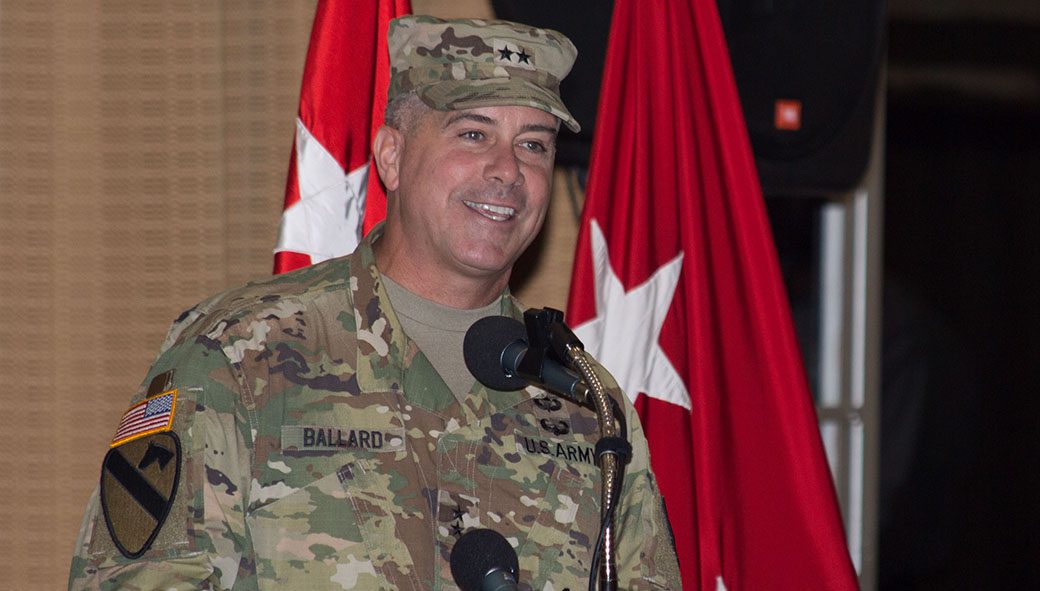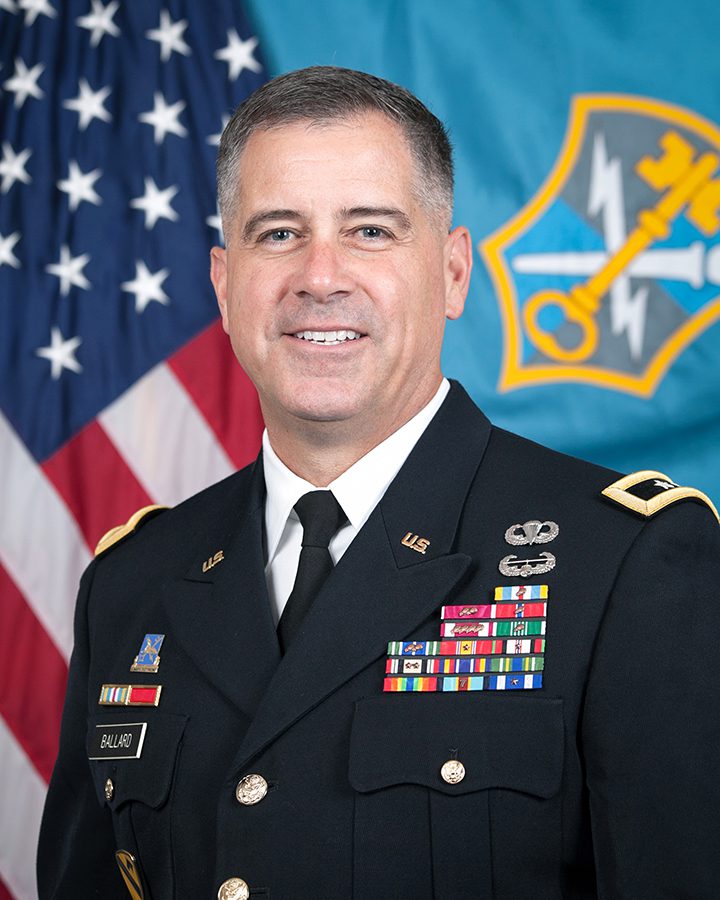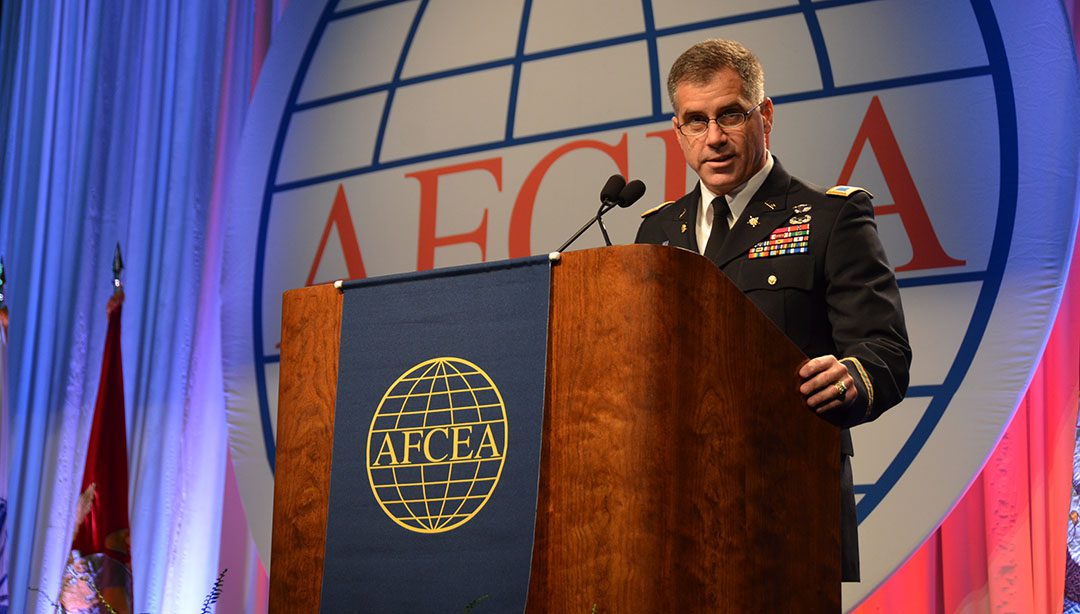Where there is a will, there is a way

It could be argued that Maj. Gen. Chris Ballard’s career path was a direct result of his desire to graduate from Furman University. At the conclusion of his freshman year at Furman, his parents set him down for a serious discussion. The bottom line was this: the tuition was more than Chris’s father, an Army chaplain, and mother could afford. They told him that if he wanted to stay at Furman, where he was double majoring in political science and German, he was going to have to find a way to help out.

Maj. Gen. Chris Ballard ’84, commanding general of the U.S. Army Intelligence and Security Command (INSCOM)
This led Ballard to Furman’s Department of Military Science (ROTC). “I had no intention of going into the Army,” he says. “I just wanted to know if there were any scholarships available.” He applied for and was awarded a three-year ROTC scholarship. “That scholarship allowed me to get to graduation,” he says.
Back in those days, according to Ballard, you paid back two years for every year of scholarship, and for him, this meant four years active duty and two years reserve. “I graduated in 1984,” he says. “This was during the Reagan buildup, so there were an awful lot of opportunities and programs that the Defense Department was allowing at that time. So I applied to delay coming on active duty so I could go to graduate school.” After two years at Indiana University in Bloomington where he earned a master’s degree in international relations, he entered active duty.
“When I came on active duty, we thought we would just pay back the scholarship,” Ballard says, referring to he and his wife’s plan. “Our first duty assignment was in Germany in the late ’80s. We were stationed north of Frankfurt in ’89 when the wall came down and were there for that whole change . . . which was particularly exciting for a political science and German major. I’ve had several tours in the Pacific, two tours in Hawaii, one in Korea, a couple in Kansas and Texas. I’ve had three combat tours, two in Afghanistan, and one in Iraq. Every time we thought we would shift gears and do something else, the Army would offer us a new challenge.”
Today Ballard is assigned to Fort Belvoir Army base in northern Virginia where he is the commanding general of U.S. Army Intelligence and Security Command (INSCOM), a unit comprised of approximately 17,500 uniformed, civilian, and contracted personnel working daily in nearly 180 locations in forty-five countries across the globe. INSCOM leverages the capabilities of the US Intelligence Community to support tactical military commanders in the execution and accomplishment of their missions. “What I’m doing now, at a senior level within the military, is really about the broader concepts of national security,” he says.
Ballard will be one of the ten alumni panelists for the “Safe and Free: Civil Liberties and the Fight for National Security” alumni conference sponsored by The Riley Institute and the Department of Politics and International Affairs to be held at Furman April 10 and 11. “To see Furman start looking at those issues and stretch in that direction is very cool . . .I’m really excited for what the Riley Institute is doing,” Ballard says.

Ballard gives the opening address at the 2012 Armed Forces Computer and Electronics Association’s TechNet Landforces East conference in Baltimore
He is always surprised by how many Furman graduates he encounters during his travels and is looking forward to meeting some fellow alums at the upcoming event. “I think what we will find at the conference is that there are many Furman graduates that have gone far afield and have done well,” he says. “I’ve gone to some very exotic countries and unique forums and have usually found a Furman graduate who is engaging and thriving. That’s pretty powerful, and I think it says a lot for the university.”
Recalling his time at Furman brings back many memories for Ballard, who met his wife Michelle during his time at the university. “She was a music major,” he says. “So even though I had no musical background at all, I tried out for the Furman Singers. Surprisingly, I made it. Michelle and I have been married for thirty-two years and actually just had dinner with Bing and Judy Vick. Bing was the Furman Singers director for many, many years. To this day I thank him for letting me in.”
Ballard keeps in touch with several other of his former professors including Donald Aiesi, Jane Chew, and Donald Gordon. “What was powerful about my Furman experience was that I had very close contact with very, very talented professors and instructors. They were my mentors, and to this day I still stay in touch with some of them. At a place like Furman you develop relationships that carry on.”
He says that the importance his professors placed on critical thinking and effective communication provided him with a strong foundation for his career in the military. “As a student, I had to take an idea, develop it, and communicate it clearly. The classes are so small that you can’t just sit in the back row and get by, you have to participate. The Army tries to teach those skills, but I came in with a great advantage. Critical thinking is vital, today more than ever.”
Learn more about the “Safe and Free: Civil Liberties and the Fight for National Security” alumni conference.